Student Union
Blind Pakistani Student is Fully Able to Win Rhodes Scholarship
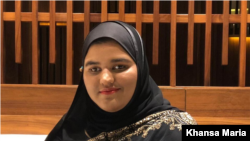
For Khansa Maria, a student at Georgetown University’s campus in Qatar, her advocacy work for people with disabilities is personal.
Maria is blind and has faced disability challenges growing up in Pakistan. And she will use that experience, she said, when she heads to Oxford University next fall as Pakistan’s 2021 Rhodes Scholar-elect, to pursue a master's degree in evidence-based policy intervention and social evaluation.
“I do have a disability, I am blind, and I firsthand experienced the impacts of not having an inclusive society,” Maria said, noting she wants to give back.
“I do have a certain responsibility to my community to improve things to the extent that I can or at least lend my skills or my experience to the benefit of future blind people from Pakistan,” she said.
Maria advocates for the disabled and educates about inclusion — whether within a friend group or a business thinking of designing its space for people with disabilities. She said she believes people should be better informed.
She attends Georgetown’s Qatar campus — called GU-Q — which follows standards set by the American with Disabilities Act and she said accommodates the disabled better than her hometown of Lahore.
Still, spaces are not always as physically accessible as they need to be to those with disabilities, and conversations and language about the disabled should be more inclusive, Maria said.
At GU-Q, she is studying for a bachelor’s degree in foreign service, with a concentration in culture and politics.
“I thought foreign service or working in someplace like the U.N. would be where I'd end up,” Maria told VOA. “So, [Georgetown] just felt like the perfect fit, where I wouldn't just focus on my advocacy skills and my ability to negotiate diplomatically, but also learn about you know, the historical implications and the economic implication of conflicts.”
Maria has been a campus leader and participant in a multitude of organizations, including the debating union, the South Asian Society, and the Hoya Leadership Pathway. She has also worked at the U.S. Embassy in Qatar.
“They were always willing to listen and adapt,” Maria said of the embassy. “And I got some amazing experiences. I was a part of a really nice team. I got some really good advice and mentorship.”
“I am grateful that my supervisors at the embassy were always supportive and always found opportunities to help me make the best of my experiences. Working with such accomplished and empowering women was a dream come true,” she told VOA.
Maria has also researched diaspora migration and how it is represented in literature. She is writing her honors thesis on the evolution of the disability rights movement in the South Asian context.
Like many college students during COVID-19, Maria has experienced pandemic upheaval.
“I had a couple of trips planned to conferences and stuff that I was supposed to go to, but I wasn't able to do that,” she said. “And I think, in another sense, obviously, there is a certain amount of isolation that came along with it for everyone. I wasn't able to travel back home to Pakistan for a year and a half, you know, classes went virtual, my job went virtual.”
Maria became interested in the Rhodes program after meeting a scholar from India. He was also blind, and they became friends. She was apprehensive at first about applying but followed through.
“I just realized there was no harm in applying,” Maria told VOA. “If nothing else, it would give me an opportunity to just reflect on my experience, get my opportunities together, get my ideas together, and just take the leap.”
She said she couldn’t believe she was selected to be a Rhodes Scholar.
“I was beyond delighted but at the same time, I couldn't believe that it had really happened,” she said. “I realized that I am privileged and am excited about all these new experiences.”
Maria said she is most excited to learn from other people at Oxford.
“You know, what was most impactful for me here [at GU-Q] was the community that I was a part of: the everyday conversations, the random debates,” Maria said. “And that's what I'm excited about — just the environment, the people that I'll meet, the stories that I’ll interact with, and all that I can learn from those people.”
See all News Updates of the Day
- By VOA News
Michigan State international students get their own space
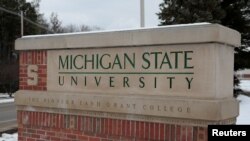
Michigan State University in East Lansing, Michigan, is setting aside a space in the International Center for international students.
Nidal Dajani, vice president of the school's International Student Association, said that the club plans to use the space to host events and hopes to collaborate with other student groups.
- By Dylan Ebs
International students find community during Pride Month
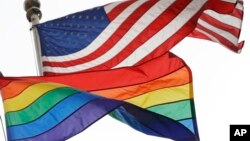
For LGBTQ+ international students, Pride Month, observed in June, is a unique time to reflect.
They hold on to multiple identities — both their LGBTQ+ identity and their cultural background — but coming to terms with them is not always easy.
For graduate student David Zhou, these identities can feel conflicting as transgender rights in China remain a controversial issue and spaces for LGBTQ people close. Zhou, 25, is transgender and pursuing an education in the STEM field at an urban university in the Midwestern United States.
VOA is using a pseudonym for Zhou’s first name and is not naming his university to protect his identity due to safety concerns back home in China. Zhou is not open about his transgender identity to his family.
During Pride Month, Zhou said he attended multiple LGBTQ+ events in his community and is surrounded by a supportive group of LGBTQ+ students who can relate to his experiences. But he’s not open about his identity to everyone on campus and said he doesn’t disclose his preferred pronouns to everyone to avoid transphobic comments.
“I feel like I have to make some judgments of the character of that person to see if they’re a good person to disclose [my identity] to,” Zhou said.
Zhou’s Pride Month celebrations included attending local markets with LGBTQ+ vendors and hanging out with his LGBTQ+ friends.
“They normalized being trans and for a long time I feel like trans identity is, should I say a vulnerability, brings me fear and worrying about discrimination, but having those events are helpful because it allowed me to see that queer people could just [live] openly,” he said.
At social events where few international students are present, Zhou said it can be tough to fit in.
“There's a lot of times like when they were talking about things I kind of, don't really understand, mostly because I kind of lack some background experience or knowledge,” he said.
Zhou said he is not aware of specific groups for LGBTQ+ international students at his university, but said international students are more prevalent in graduate programs and therefore find representation in organizations for LGBTQ+ graduate students.
In China, transgender individuals must obtain consent from an “immediate family member,” even for adults hoping to transition, which critics say limits the autonomy of transgender individuals while supporters say the policy protects doctors from violence by upset parents.
Struby Struble, a former coordinator of the University of Missouri LGBTQ+ Resource Center, told NAFSA: Association of International Educators in 2015 that LGBTQ+ international students face a “double barrier” on campus.
“With their international student friends, they feel isolated because they’re the LGBT one,” she said. “But then among the LGBT students on campus, they feel isolated because they’re the international one.”
Nick Martin, associate director of the Q Center, Binghamton University’s LGBTQ+ student support office, said when international students tour the center, there’s often a sense of hesitation as they enter a type of space that may not be present in their home country.
“I compare that to a year in after they've come into the space, they've again, maybe come to some of our events, they've got more connected,” he said.
Martin said graduate students have a unique interest in the Q Center as they may use the office for research and advocacy purposes that align with their studies.
“For older students, there may be hesitancy in a different way, but I think it's more in the vein of they want to do some of the advocacy work,” he said.
Martin said he thinks about how both his office and BU’s international student office can support students who come from countries with few — if any — protections for LGBTQ+ individuals.
“It's been a learning process of what those students really need, but I think I've kind of learned that a lot of students are just looking for the safe space that we offer,” Martin said.
- By VOA News
International students discuss US campus culture shock

International students at De Anza College in Cupertino, California, talked about culture shock in an article in La Voz News, the student newspaper.
"It felt like a major culture shock. Everything was so different, from academics to mannerism," said a student from Mexico.
Read the full story here.
These are the most expensive schools in the US
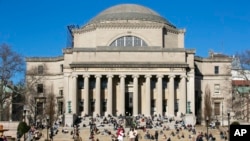
High tuition costs along with housing and food expenses can add up for students at U.S. colleges and universities.
MSNBC looked at the most expensive schools in the country, with one costing more than $500,000 for a bachelor’s degree. (June 2024)
Uzbekistan students admitted into top US universities
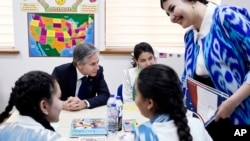
Students from Uzbekistan are among the international students admitted to top colleges and universities in recent years.
Gazata.uz profiled some of the Uzbekistan students attending Harvard, Brown, Princeton and other U.S. universities. (June 2024)






